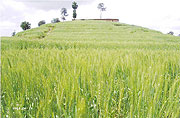HUYE – The land consolidation drive has attracted mixed reactions from different parts of Huye District, with some residents supporting the policy, while others have expressed reservations. In Rwaniro Sector, some local residents have found difficulty in embracing the new programme.


HUYE – The land consolidation drive has attracted mixed reactions from different parts of Huye District, with some residents supporting the policy, while others have expressed reservations.
In Rwaniro Sector, some local residents have found difficulty in embracing the new programme.
Freddy Ndikumana, a sector official in charge of agriculture says under this new programme, local residents will be encouraged to grow maize, cassava or rice within farm holdings as selected crops. In this programme maize is expected to be given priority.
However, despite expression of support by a cross section of residents, others seem not to be convinced about the benefits of consolidating their small plots of land and growing selected crops.
Those still reluctant argue that the traditional mixed farming is more preferable and much promising with regard to increased farm output.
"We used to grow so many crops in one field and by that we were sure that once one crop failed we would benefit from the other,” said Beatrice Mukanyangezi, a resident of Kibiraro cell.
Many are opposed to the cultivation of maize as a priority crop in the sector, "We are not ready to plant maize only.
We used to combine it with beans and other crops but what we are being told by authorities to plant maize alone on a single holding is something completely new to us,” said Seraphine Mukankusi, a 54-year-old from Nyakabuye village.
Some residents are however, optimistic about the benefits that come with land consolidation and growing selected crops.
"This will help us increase production since growing one crop on a large piece of land increases the chance for increased yields,” noted Aloysie Nyiraminani of Gatwaro cell.
The officer in -charge of agriculture in the sector attributes the varied reactions to the land consolidation drive, to people’s attitude and negative mentality towards change.
"Residents are used to growing traditional crops like cassava and beans on the same farm, it is expected that they will attempt to resist such moves, but we hope they will change after realising the advantages accruing from the new policy,” Ndikumana said.
The new land use consolidation policy aims at bringing fragmented plots of land together and having selected crops grown on the consolidated land as one way of maintaining food security.
In the neighbouring district of Nyaruguru, authorities are reporting that residents are reaping from the new policy.
Reports indicate that those embracing the new policy are able to harvest about 20 tonnes of potatoes per hectare.
Ends




